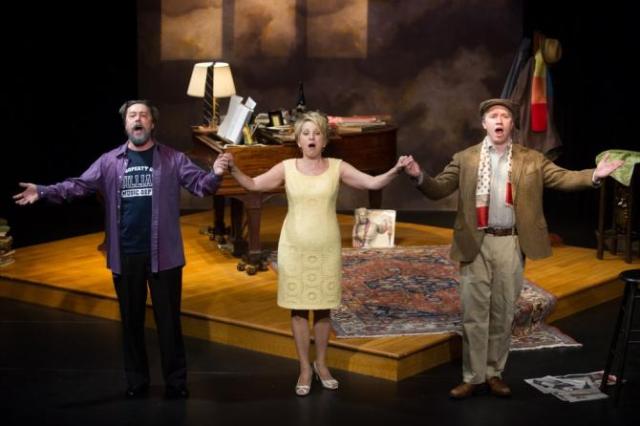

Writing an opera is hard work. Writing a musical is also hard work. When you try to combine the two, it can result in something beautiful or become a train wreck. Unfortunately, the latter is mainly the case in the world premiere of Daron Hagen’s I Hear America Singing,at Milwaukee’s Skylight Music Theater.
For the uninitiated, Daron Hagen is “one of America’s most successful opera composers,” according to a press bio. A Milwaukee native, he has gone on to compose operas for a handful of regional opera companies. He also has had commissions from the New York Philharmonic (among many other symphonies), and has collaborated with the likes of Leonard Bernstein (West Side Story), Gian Carlo Menotti (Amahl and the Night Visitors” and composer Leonard Slatkin. In 2012, Hagen was awarded a Guggenheim Fellowship.
Hagen graduated from the University of Wisconsin-Madison and went on to study at Juilliard. He pays tribute to his alma mater by making the three characters in Singing all Juilliard alums. One of them, Robbie, a composer, presses the point home by wearing a tattered, faded t-shirt that reads: Juilliard Music Dept. It is obviously a left-over from Robbie’s campus days. It serves as a constant reminder that Robbie, loveable as he is, will never move on from those golden years.
But that’s getting ahead of ourselves. What composer/director Daron Hagen attempts to do in Singing is to create a new type of musical, one that combines show tunes, arias and art songs, as well as American folk tunes. It is an ambitious effort, and one truly wishes that the results were more impressive than one observes in Singing. The score, composed mainly in minor keys, is dissonant to the point of irritability. Even the soprano (Carol Greif) offers some unintended humor about this situation. She admits that her part consists mainly of warbling and harmonizing. She wishes she could “sing the melody for a change.” At least this observer couldn’t agree more.
The plot is ploddingly predictable. Two decades after graduation, the three characters meet at Robbie’s Manhattan apartment. All of them are burned out. They have been reduced to supporting roles and are barely scraping by financially. The soprano (Rose) and the baritone (Roger) at first have a prickly exchange as one might expect from a divorced couple, which they are.
Robbie hopes to cajole the couple into performing an updated version of the show that first catapulted him into the national spotlight. “Love and loss – that’s what binds us as a nation,” he says, trying to get them enthused about the project. Robbie wants to replace the song’s original words with new lyrics, many selected from poems by Gertrude Stein, A.E. Houseman, and William Blake. The songs will be drawn from various periods in American history, from the Civil War to World War II. Robbie does have another reason for getting them together. “I want things to be the way they were.” He talks at length about a time when all three were close friends, hopeful, and ready to take the entertainment world by storm. “I really want to recapture that,” he tells them, to which Roger retorts, “I’d like my hairline back, too.” If this script sounds a bit like the 1981 Sondheim musical, Merrily We Roll Along, that’s no coincidence. Except that Sondheim’s musical had two distinctly different elements that I Hear America Singing does not. 1) The composer in Merrily (Franklin Shepard) “sells out” to the film industry and becomes incredibly wealthy. 2) Merrily is told in reverse chronology, so the ending is actually the beginning. Thus, the musical ends on an uplifting note, when all of the characters are young, eager, naïve, best friends, etc.
In I Hear America Singing, the first song has a melody that many will recognize from Merrily. Also, Robbie’s character actually looks like Sondheim in his late 50s, with slicked back, salt-and-pepper-colored hair and a beard. Roger even makes a derisive comment about Robbie’s talent by saying “some Sondheim he is.”
I Hear America Singing is certainly not the fault of the talented cast, all of whom perform brilliantly. They overcome many pitfalls contained in this complicated piece of theater without a hitch. However, it was clear on opening night that the cast was working very hard to keep the illusion aloft. Hats off to them all: Robert Frankenberry, who plays Robbie and also is the show’s music director; Carol Greif as Rose, and Rick Pendzich, who convincingly plays a reformed alcoholic as well as demonstrating a fine voice. The inevitable conflict that threatens to breaks up this trio proves shockingly dated. Here’s what happens: Roger is adamant that Robbie’s mid-life shift in sexual orientation not be included in any of the show’s lyrics. Robbie, proud of his “coming out,” is more than a little hurt by Roger’s attack. Roger goes on to complain that gay-themed lyrics will “turn off” potential backers and audiences. “What will the bridge-and-tunnel crowd think of this?” he actually says.
In reality, isn’t it difficult to find a Broadway show that doesn’t deal with gay/straight dynamics? It’s almost laughable that Hagen would choose this subject as a source of conflict. For all its faults, I Hear America Singing reveals Hagen’s deep love of the theater and of music. The Skylight Musical Theater does the best it can with the material, shoring up the production with a cramped, realistic set that suits Robbie’s character (remember, it’s supposed to be his Manhattan apartment). A small section of the set is gives the impression of a theater’s backstage – a constant reminder of where these characters want to be, whether they are wanted or not.
